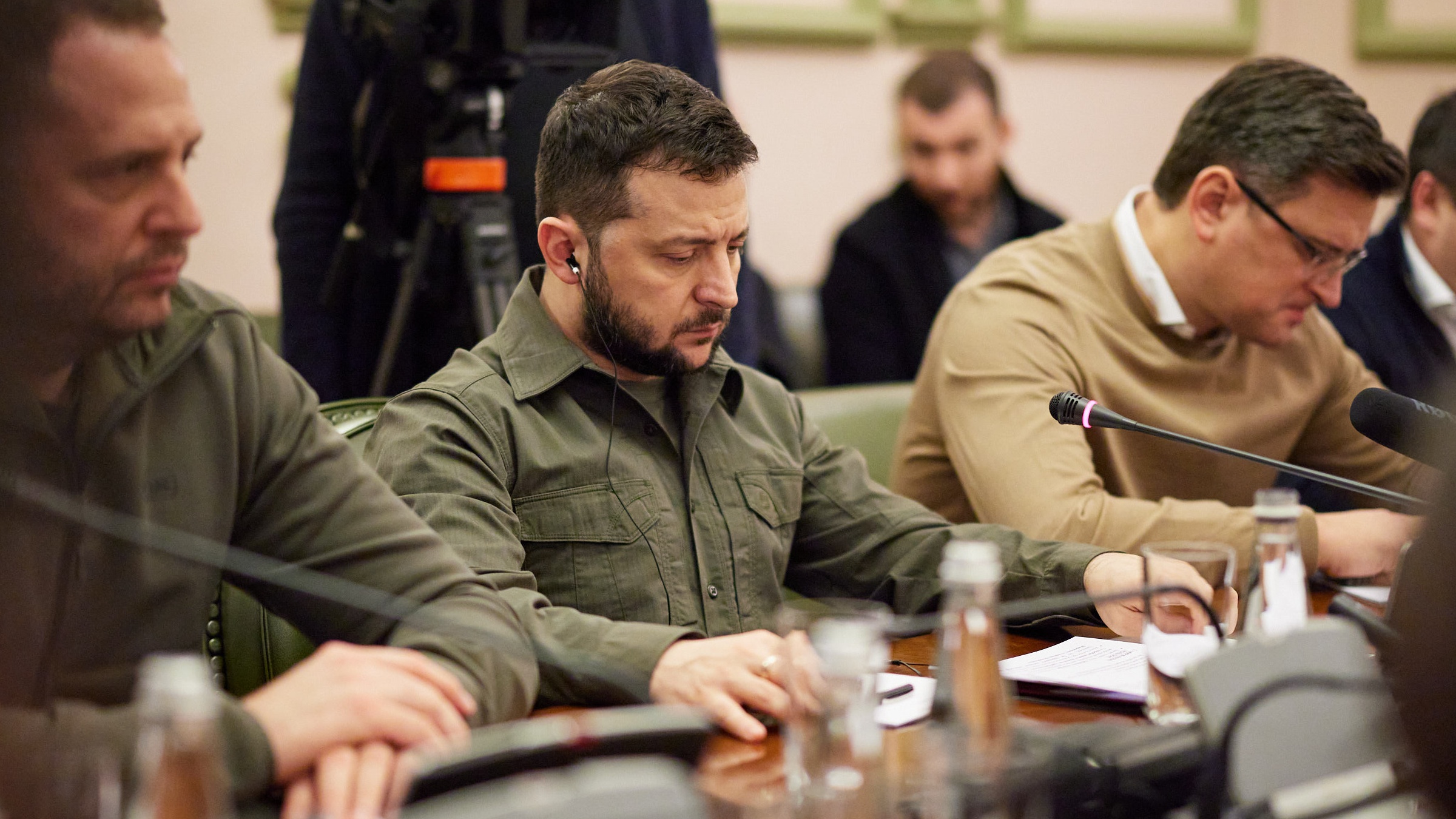Volodymyr Zelenskyy refused evacuation as Russian hitmen ‘parachuted’ into Kyiv
Ukrainian president turned down opportunity to leave capital despite threat to life, adviser claims

A free daily email with the biggest news stories of the day – and the best features from TheWeek.com
You are now subscribed
Your newsletter sign-up was successful
A close adviser to Volodymyr Zelenskyy has revealed how the Ukrainian president refused to be evacuated from Kyiv even as Russian assassination squads tried to storm the capital to kill him.
Oleksiy Arestovych, a veteran of Ukraine’s military intelligence service, told Time that as the president’s HQ came under attack at the start of the invasion, those inside defended themselves with automatic weapons and built rudimentary defences.
Describing the scene, Arestovych said: “It was an absolute madhouse. Automatics for everyone. The place was wide open. We didn’t even have concrete blocks to close the street.”
The Week
Escape your echo chamber. Get the facts behind the news, plus analysis from multiple perspectives.

Sign up for The Week's Free Newsletters
From our morning news briefing to a weekly Good News Newsletter, get the best of The Week delivered directly to your inbox.
From our morning news briefing to a weekly Good News Newsletter, get the best of The Week delivered directly to your inbox.
The military then “informed Zelenskyy that Russian strike teams had parachuted into Kyiv to kill or capture him and his family”, the magazine said. Both UK and US forces then “offered to evacuate Zelenskyy and allow him to set up a government in exile”, The Telegraph reported. “But he never seriously thought about it.”
Explaining his decision not to flee, Zelenskyy told Time that he was sending a message to the people of Ukraine. “You understand that they’re watching,” he said. “You’re a symbol. You need to act the way the head of state must act.”
In the early days of the invasion, the president would wake before dawn and have his first meeting with his top general at 5am, “before the light began peeking through the sandbags in the windows of the compound”, Time reported.
As the war progressed, it then became “typical for the president and his staff to gather around a phone or laptop in the bunker”, the magazine added, “cursing images of devastation or cheering a drone strike on a Russian tank”.
A free daily email with the biggest news stories of the day – and the best features from TheWeek.com
-
 How the FCC’s ‘equal time’ rule works
How the FCC’s ‘equal time’ rule worksIn the Spotlight The law is at the heart of the Colbert-CBS conflict
-
 What is the endgame in the DHS shutdown?
What is the endgame in the DHS shutdown?Today’s Big Question Democrats want to rein in ICE’s immigration crackdown
-
 ‘Poor time management isn’t just an inconvenience’
‘Poor time management isn’t just an inconvenience’Instant Opinion Opinion, comment and editorials of the day
-
 What would a UK deployment to Ukraine look like?
What would a UK deployment to Ukraine look like?Today's Big Question Security agreement commits British and French forces in event of ceasefire
-
 Would Europe defend Greenland from US aggression?
Would Europe defend Greenland from US aggression?Today’s Big Question ‘Mildness’ of EU pushback against Trump provocation ‘illustrates the bind Europe finds itself in’
-
 Taiwan eyes Iron Dome-like defence against China
Taiwan eyes Iron Dome-like defence against ChinaUnder the Radar President announces historic increase in defence spending as Chinese aggression towards autonomous island escalates
-
 Is conscription the answer to Europe’s security woes?
Is conscription the answer to Europe’s security woes?Today's Big Question How best to boost troop numbers to deal with Russian threat is ‘prompting fierce and soul-searching debates’
-
 Trump peace deal: an offer Zelenskyy can’t refuse?
Trump peace deal: an offer Zelenskyy can’t refuse?Today’s Big Question ‘Unpalatable’ US plan may strengthen embattled Ukrainian president at home
-
 The Baltic ‘bog belt’ plan to protect Europe from Russia
The Baltic ‘bog belt’ plan to protect Europe from RussiaUnder the Radar Reviving lost wetland on Nato’s eastern flank would fuse ‘two European priorities that increasingly compete for attention and funding: defence and climate’
-
 How should Nato respond to Putin’s incursions?
How should Nato respond to Putin’s incursions?Today’s big question Russia has breached Nato airspace regularly this month, and nations are primed to respond
-
 What will bring Vladimir Putin to the negotiating table?
What will bring Vladimir Putin to the negotiating table?Today’s Big Question With diplomatic efforts stalling, the US and EU turn again to sanctions as Russian drone strikes on Poland risk dramatically escalating conflict